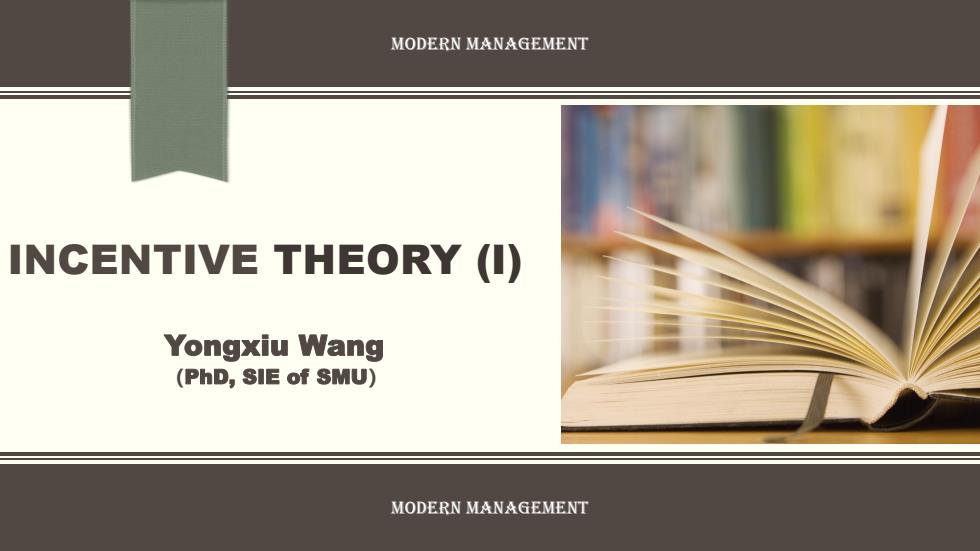
MODERN MANAGEMENT INCENTIVE THEORY (I) Yongxiu Wang (PhD,SIE of SMU) MODERN MANAGEMENT
Modern ManageMent Modern ManageMent INCENTIVE THEORY (I) Yongxiu Wang (PhD, SIE of SMU)

Importance of motivation ●Management ●Management 管理心理学简编 管理心理学 GUANLIXINLIXUE psychology 套维韩分主物机级发主条月后时上酒 原理与应用 偏○戴健林 ●How to fully mobilize 王乐伟 people's behavior enthusiasm ●INCENTIVE should be 广家高等软有影厦 the core 清华大学出延社
Modern ManageMent Importance of motivation l Management l Management psychology l How to fully mobilize people's behavior enthusiasm l INCENTIVE should be the core
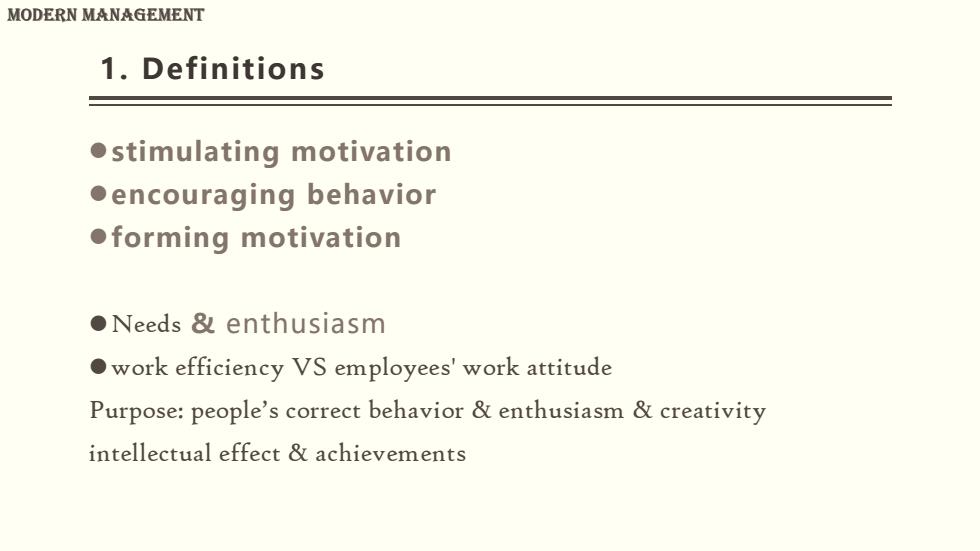
MODERN MANAGEMENT 1.Definitions stimulating motivation encouraging behavior ●forming motivation ●Needs&enthusiasm work efficiency VS employees'work attitude Purpose:people's correct behavior enthusiasm creativity intellectual effect achievements
Modern ManageMent 1. Definitions lstimulating motivation lencouraging behavior lforming motivation lNeeds & enthusiasm lwork efficiency VS employees ' work attitude Purpose: people’s correct behavior & enthusiasm & creativity intellectual effect & achievements
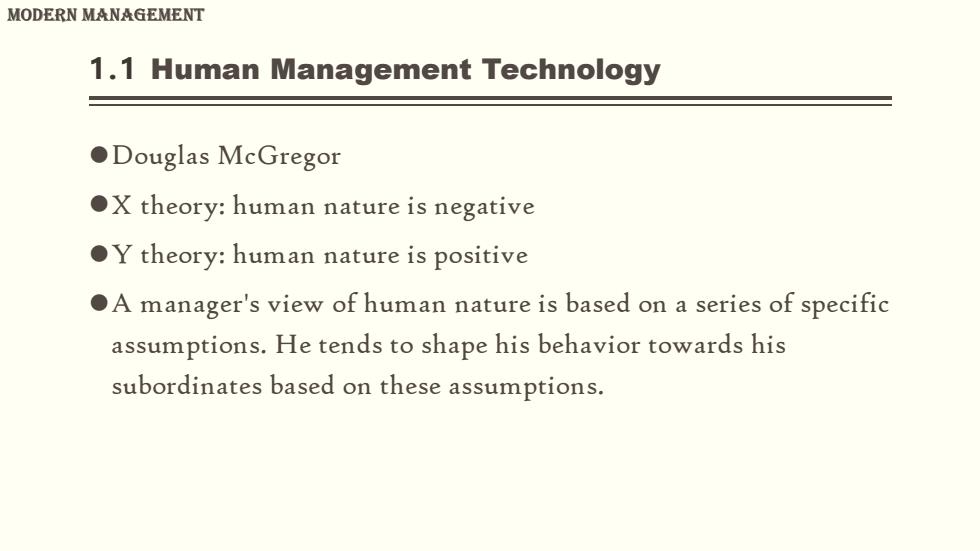
MODERN MANAGEMENT 1.1 Human Management Technology ●Douglas McGregor OX theory:human nature is negative OY theory:human nature is positive A manager's view of human nature is based on a series of specific assumptions.He tends to shape his behavior towards his subordinates based on these assumptions
Modern ManageMent 1.1 Human Management Technology lDouglas McGregor lX theory: human nature is negative lY theory: human nature is positive lA manager ' s view of human nature is based on a series of specific assumptions. He tends to shape his behavior towards his subordinates based on these assumptions
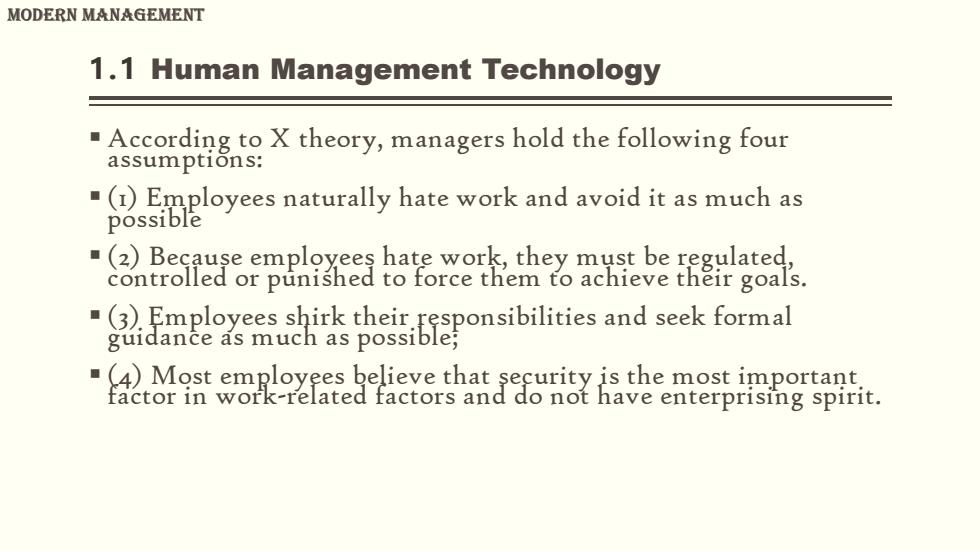
MODERN MANAGEMENT 1.1 Human Management Technology "According to X theory,managers hold the following four assumptions: (1)Employees naturally hate work and avoid it as much as possible (2)Because employees hate work,they must be regulated, controlled or punished to force them to achieve their goals. (3)Employees shirk their responsibilities and seek formal guidance as much as possible; (4)Most employees believe that security is the most important. factor in work-related factors and do not have enterprising spirit
Modern ManageMent 1.1 Human Management Technology § According to X theory, managers hold the following four assumptions: § (1) Employees naturally hate work and avoid it as much as possible § (2) Because employees hate work, they must be regulated, controlled or punished to force them to achieve their goals. § (3) Employees shirk their responsibilities and seek formal guidance as much as possible; § (4) Most employees believe that security is the most important factor in work-related factors and do not have enterprising spirit
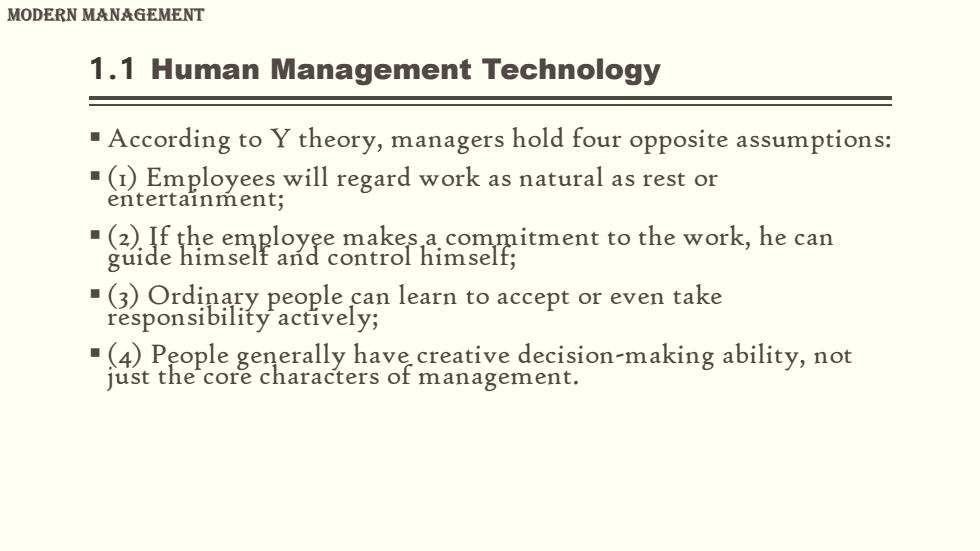
MODERN MANAGEMENT 1.1 Human Management Technology "According to Y theory,managers hold four opposite assumptions: (1)Employees will regard work as natural as rest or entertainment; (2).If the employee makes,a commitment to the work,he can guide himselt and control himself; (3)Ordinary people can learn to accept or even take responsibility actively; (4)People generally have creative decision-making ability,not just the core characters of management
Modern ManageMent 1.1 Human Management Technology § According to Y theory, managers hold four opposite assumptions: § (1) Employees will regard work as natural as rest or entertainment; § (2) If the employee makes a commitment to the work, he can guide himself and control himself; § (3) Ordinary people can learn to accept or even take responsibility actively; § (4) People generally have creative decision-making ability, not just the core characters of management
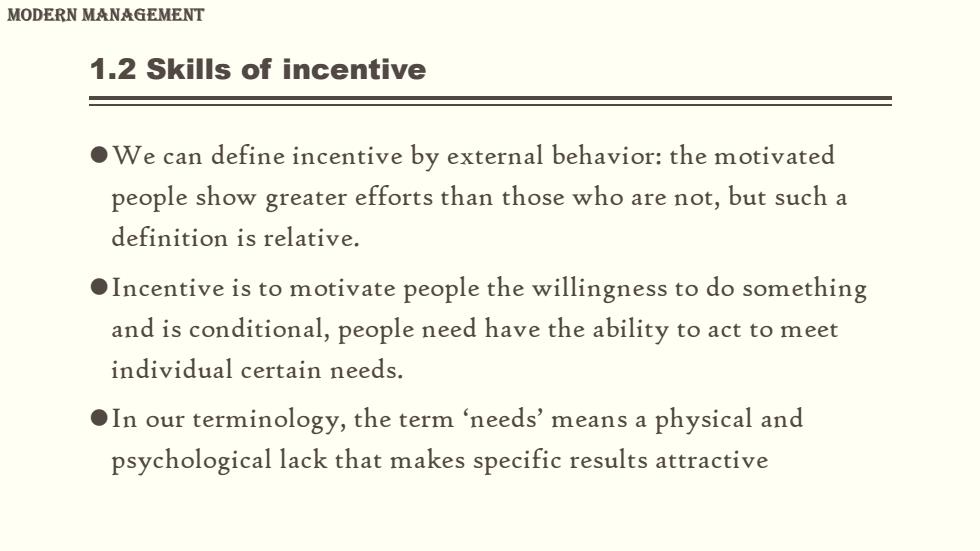
MODERN MANAGEMENT 1.2 Skills of incentive oWe can define incentive by external behavior:the motivated people show greater efforts than those who are not,but such a definition is relative. Incentive is to motivate people the willingness to do something and is conditional,people need have the ability to act to meet individual certain needs. OIn our terminology,the term needs'means a physical and psychological lack that makes specific results attractive
Modern ManageMent 1.2 Skills of incentive lWe can define incentive by external behavior: the motivated people show greater efforts than those who are not, but such a definition is relative. lIncentive is to motivate people the willingness to do something and is conditional, people need have the ability to act to meet individual certain needs. lIn our terminology, the term ‘needs’ means a physical and psychological lack that makes specific results attractive
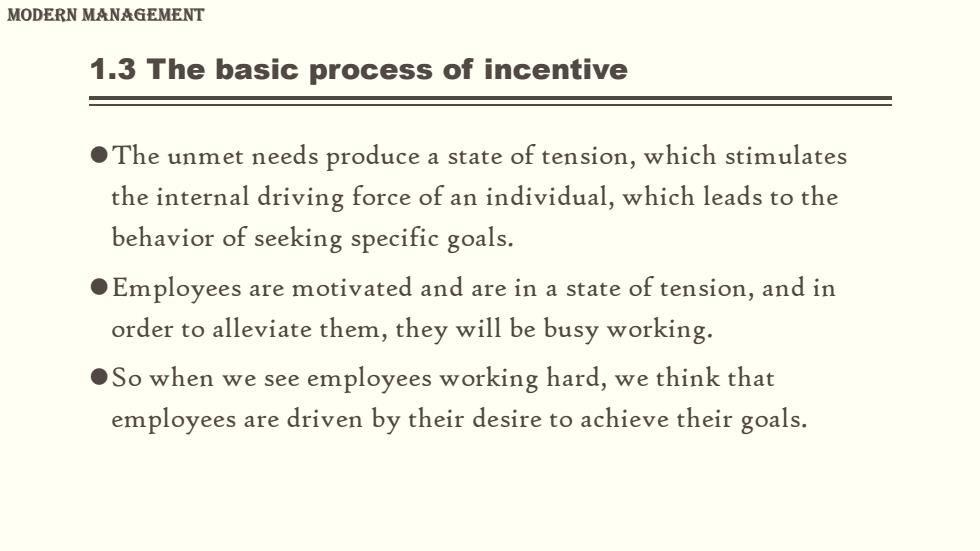
MODERN MANAGEMENT 1.3 The basic process of incentive OThe unmet needs produce a state of tension,which stimulates the internal driving force of an individual,which leads to the behavior of seeking specific goals. Employees are motivated and are in a state of tension,and in order to alleviate them,they will be busy working. So when we see employees working hard,we think that employees are driven by their desire to achieve their goals
Modern ManageMent 1.3 The basic process of incentive lThe unmet needs produce a state of tension, which stimulates the internal driving force of an individual, which leads to the behavior of seeking specific goals. lEmployees are motivated and are in a state of tension, and in order to alleviate them, they will be busy working. lSo when we see employees working hard, we think that employees are driven by their desire to achieve their goals
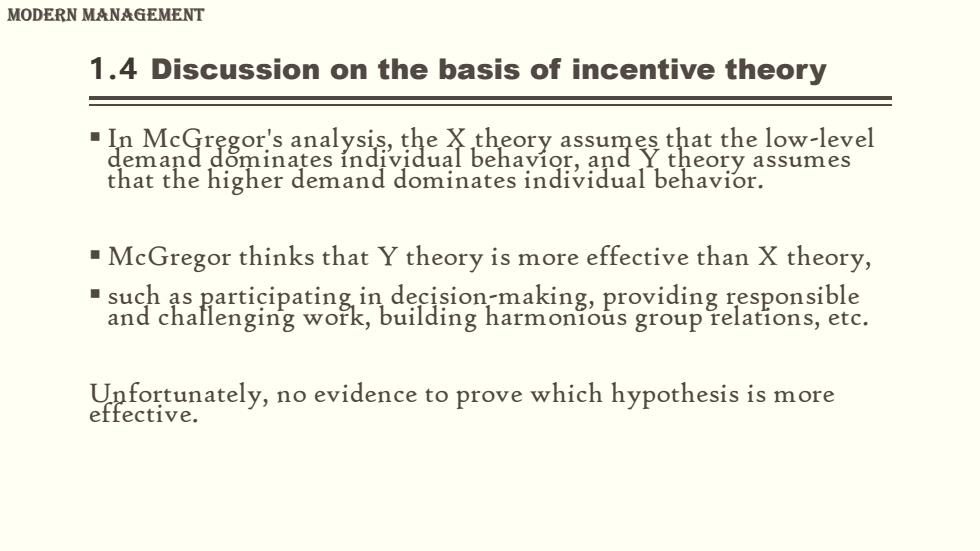
MODERN MANAGEMENT 1.4 Discussion on the basis of incentive theory eman some benavstaheor aumevel that the higher demand dominates individual behavior. "McGregor thinks that Y theory is more effective than X theory, such as participating in,decision-making,providing responsible and chaflenging work,building harmonious group relations,etc. Upfortunately,no evidence to prove which hypothesis is more effective
Modern ManageMent 1.4 Discussion on the basis of incentive theory § In McGregor ' s analysis, the X theory assumes that the low-level demand dominates individual behavior, and Y theory assumes that the higher demand dominates individual behavior. § McGregor thinks that Y theory is more effective than X theory, § such as participating in decision-making, providing responsible and challenging work, building harmonious group relations, etc. Unfortunately, no evidence to prove which hypothesis is more effective
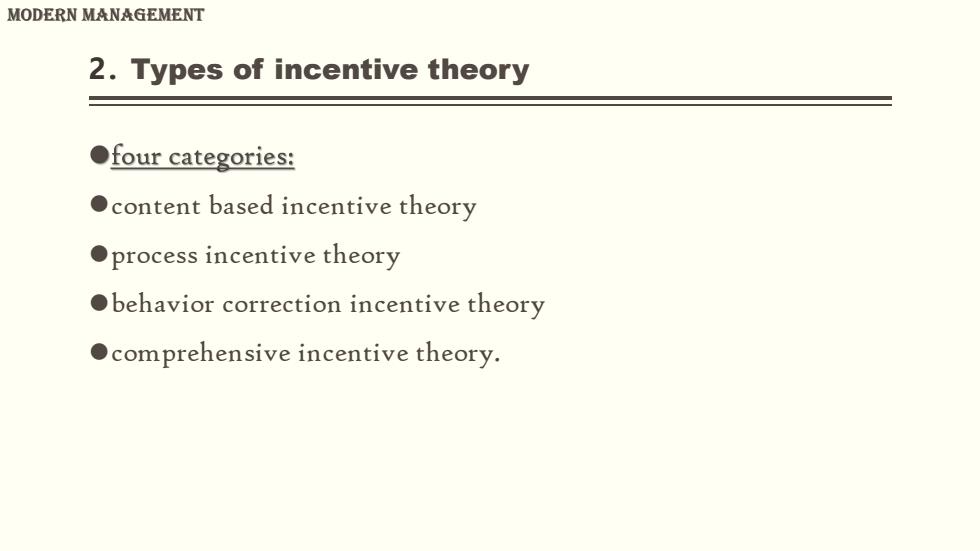
MODERN MANAGEMENT 2.Types of incentive theory ●four categories: Ocontent based incentive theory Oprocess incentive theory obehavior correction incentive theory Ocomprehensive incentive theory
Modern ManageMent 2. Types of incentive theory lcontent based incentive theory lprocess incentive theory lbehavior correction incentive theory lcomprehensive incentive theory